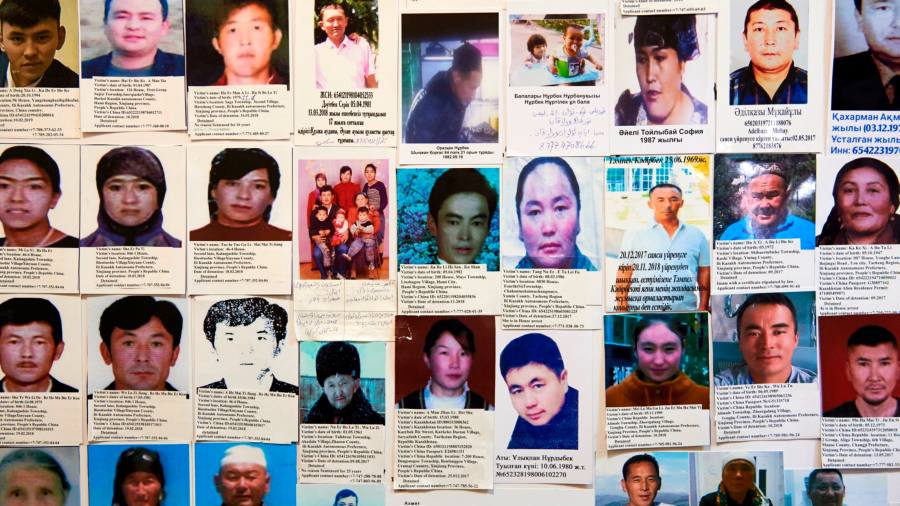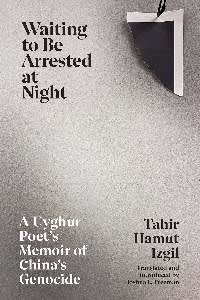
Receive free Non-Fiction updates
We’ll send you a myFT Daily Digest email rounding up the latest Non-Fiction news every morning.
You think you know the outlines of the plot: the photos of men in chains, the accusations and denials that accompanied Beijing’s detention of hundreds of thousands of Turkic Muslims in China’s northwestern border region of Xinjiang.
The UN has suggested that this particular atrocity — the erasure of Islam and the detention of its adherents in Xinjiang — might amount to “crimes against humanity”. It is one of the largest detentions of an ethnic or religious group since the Holocaust. Yet the larger the atrocity, the harder it can be to grasp at a human level.
In his debut book, Tahir Hamut Izgil, one of the Uyghur language’s most celebrated living poets, brings us inside the life of a Uyghur intellectual living in Xinjiang’s capital city of Urumqi in the city’s dying days. Waiting To Be Arrested At Night is a first-person account of his life in the years up to the mass detention campaign that began in 2017.
Izgil introduces us to a community that we will never be able to meet: a world of camaraderie, late-night feasts and poetry recitals; the Uyghur men riding bicycles to the bazaar with music blasting from the radios strung around their necks; the errant neighbourhood bookseller who sleeps until noon.
It’s all too clear that many of these people will disappear into the camps that the Chinese government has built across the Xinjiang region. By contrast, Izgil and his family escaped to the US, where he is now able to write and to publish. He deserves to be read and listened to widely.

The most fascinating parts of the book deal with the lesser-known periods of Xinjiang’s history, the decade that led up to the mass detention campaigns, when religious freedoms were gradually being eroded. It provides a lesson in how crackdowns gather momentum and, in particular, how omnipresent surveillance speeds up minoritised groups’ internalisation of their oppression.
After the police compel families to hand in their religious items, rumours circulate that they have a device that magically detects Qu’rans and prayer mats. In a regime where Uyghurs are also co-opted into the surveillance apparatus, the complexities of allegiance and identity are endless.
The book begins with Izgil being pulled into a police interrogation. First he’s left alone in the station for an hour: a psychological test. Then the police officer’s pen gives him trouble; he has to shake it repeatedly to get the ink flowing. But rather than going to get another pen, he persists. “His patience surprised me,” Izgil quips.
Yet Uyghur victims of the system are not merely victims. Izgil’s explorations of when to resist, and when to quietly accept the overtures of police officers, provide useful instruction for anyone wrestling with authoritarian power.
Halfway through directing a television series, Izgil is told by his producer of a directive banning the common Islamic greeting assalamu alaikum from broadcast. Izgil pushes back, saying that the directive did not come in writing from the propaganda ministry, and they have already filmed too much to start afresh. Shortly after, Izgil hears that the directive has been rescinded; he emerges victorious.
Yet barely two years later, the regional government had issued even harsher injunctions against common Islamic names, such as Aisha and Muhammad, and Islamic references in place names; no Uyghur dared greet one another with assalamu alaikum.
This is a beautiful read. Izgil’s poetic gaze, and the elegant translation by Joshua L Freeman, together produce a compact, compelling prose that pushes you to keep reading on, even as you blink back tears. “In this life, perhaps it is my fate to leave those closest to me with no goodbyes,” Izgil writes as he nears America.
Waiting to be Arrested at Night: A Uyghur Poet’s Memoir of China’s Genocide by Tahir Hamut Izgil, translated and introduced by Joshua L Freeman Jonathan Cape, £18.99, 272 pages
Yuan Yang is the FT’s Europe-China correspondent
Join our online book group on Facebook at FT Books Café